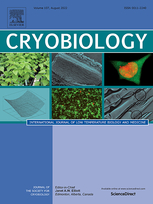
Une décongélation progressive améliore la conservation des artères cryoconservées.
Gradual thawing improves the preservation of cryopreserved arteries.
Auteurs : BUJÀN J., PASCUAL G., LÓPEZ R., et al.
Type d'article : Article
Résumé
The study was designed to test a slow, controlled, automated process for the thawing of cryopreserved arteries, whereby specimen warming is synchronized with the warming of its environment. Segments of minipig iliac artery, 4-5 cm in length, were subjected to controlled, automated cryopreservation in a biological freezer at a cooling rate of 1 °C/min to -120 °C, followed by storage in liquid nitrogen at -196 °C for 30 days. Following storage, the arterial segments were subjected to rapid (approximately 100 °C/min) or gradual (1 °C/min) thawing. Thawed specimens were processed for light microscopy and for scanning and transmission electron microscopy. Cell death was determined by the TUNEL method. Metalloproteinase (MMP) expression was estimated by immunohistochemical analysis. Vessels thawed most rapidly showed spontaneous fractures, mainly microfractures, whereas these were absent in specimens thawed slowly. In vessels thawed rapidly, the proportion of damaged cells was twice as important as the proportion observed in specimens thawed more gradually. Increased intensity and extent of MMP-2 expression was shown by rapidly-thawed specimens. The slow-thawing protocol avoids the accumulation of fluid within the arterial wall tissue. This results in improved tissue preservation.
Détails
- Titre original : Gradual thawing improves the preservation of cryopreserved arteries.
- Identifiant de la fiche : 2002-2152
- Langues : Anglais
- Source : Cryobiology - vol. 42 - n. 4
- Date d'édition : 06/2001
Liens
Voir d'autres articles du même numéro (2)
Voir la source
Indexation
- Thèmes : Influence du froid sur les cellules, tissus et organes
- Mots-clés : Décongélation; Cryobiologie; Procédé; Système sanguin; Cryoconservation
-
Nature of the vehicle solution for cryopreserva...
- Auteurs : SCHILLING A., GLUSA E., MULLER-SCHWEINITZER E.
- Date : 04/1995
- Langues : Anglais
- Source : Cryobiology - vol. 32 - n. 2
Voir la fiche
-
Cryopreservation of vascular endothelial cells ...
- Auteurs : PEGG D. E.
- Date : 02/2002
- Langues : Anglais
- Source : Cryobiology - vol. 44 - n. 1
Voir la fiche
-
Cryopreservation of the common carotid artery o...
- Auteurs : SONG Y. C., HUNT C. J., PEGG D. E.
- Date : 08/1994
- Langues : Anglais
- Source : Cryobiology - vol. 31 - n. 4
Voir la fiche
-
Cryopreservation of the common carotid artery o...
- Auteurs : SONG Y. C., PEGG D. E., HUNT C. J.
- Date : 10/1995
- Langues : Anglais
- Source : Cryobiology - vol. 32 - n. 5
Voir la fiche
-
Arterial smooth muscle function after prolonged...
- Auteurs : MULLER-SCHWEINITZER E.
- Date : 08/1994
- Langues : Anglais
- Source : Cryobiology - vol. 31 - n. 4
Voir la fiche
